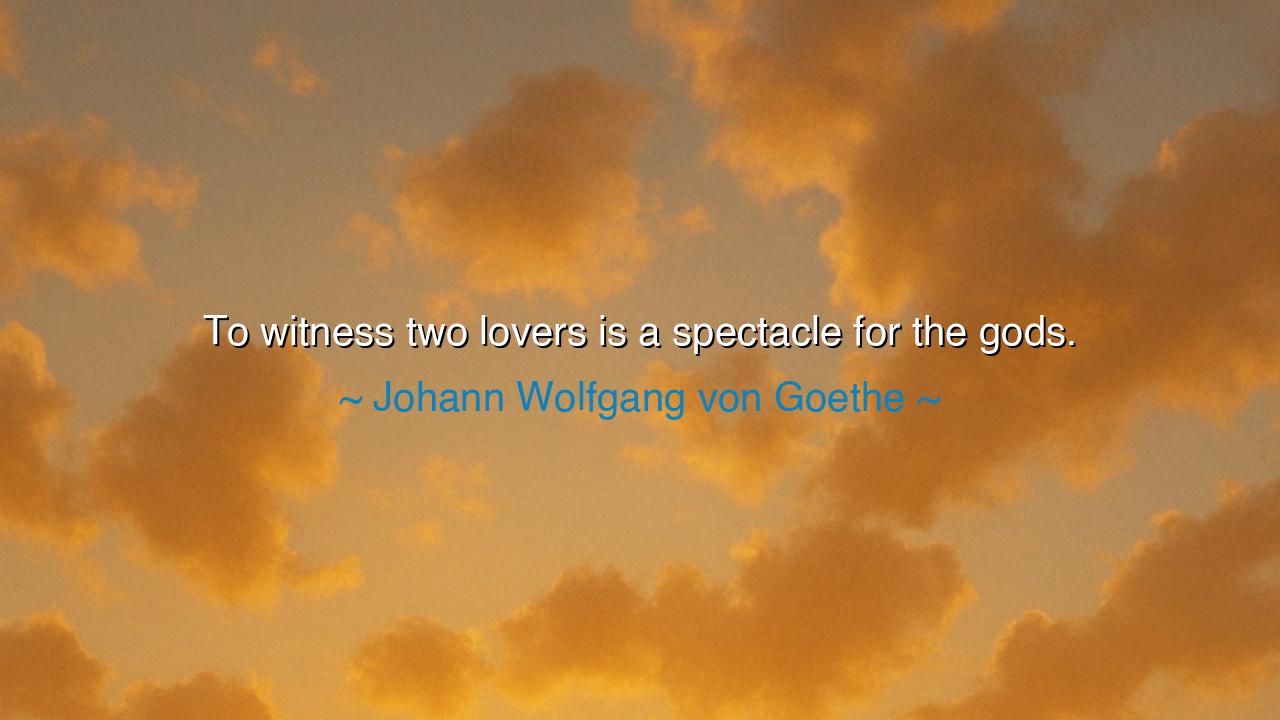
To witness two lovers is a spectacle for the gods.






"To witness two lovers is a spectacle for the gods." These words, spoken by the great Johann Wolfgang von Goethe, reflect the timeless beauty and divine nature of love. The image he paints is one of profound significance, suggesting that the act of witnessing two souls, bound together in deep affection, is not a mere human experience, but one that transcends our mortal realm. When love is pure, when it is true and unconditional, it becomes something so remarkable that even the gods themselves would pause to observe it. Love, in its most intense and unified form, rises above the mundane, becoming a celestial act—one that stirs the heavens themselves.
In the ancient world, the gods were believed to oversee the most intimate parts of human life. Plato, in his dialogue The Symposium, explores love as a divine force that drives us towards truth and beauty. For the ancients, love was not a mere emotion, but a sacred force that connects humans to the divine. When two lovers come together, their bond is seen as an earthly reflection of this higher truth, a sacred union that channels the eternal energy of creation. Goethe’s quote calls to this idea, reminding us that the love between two people, when it is true, is not simply an affair of the heart—it is a miracle that mirrors the divine.
Consider, for example, the story of Orpheus and Eurydice, a tale from ancient Greece that encapsulates the divine nature of love. Orpheus, a musician whose songs could charm even the gods, loved his wife, Eurydice, so deeply that when she died, he descended into the underworld to bring her back. His love was so profound that it moved the very gods of the underworld. Yet, it was also tragic, for when Orpheus looked back at Eurydice, he lost her forever. This story speaks to the divine power of love, for even the gods were moved by it. To witness Orpheus and Eurydice’s love, with its sacrifice, devotion, and transcendence, would have indeed been a spectacle worthy of the gods themselves. Their love was not just for each other, but for the very soul of humanity.
Goethe’s words also draw us to the romantic relationship between Heloise and Abelard, whose love story has endured for centuries. Their bond, though marked by tragedy, was one of intense passion and intellectual connection. Heloise, a brilliant scholar, and Abelard, a renowned philosopher, were bound not just by physical attraction but by a deep intellectual and emotional connection. When Abelard was castrated as a result of their illicit love, Heloise’s devotion to him never wavered. Their love, though forbidden and burdened by sorrow, was so pure and so powerful that it became an enduring symbol of true and unwavering love—a love that no misfortune could extinguish. To witness their connection, despite the suffering it caused them, would indeed be a spectacle for the gods, a love that defied earthly limitations and transcended the material world.
But Goethe’s quote is not just a reflection on romantic love between famous figures. It speaks to the very nature of love itself, and to the energy that two people can create when they are in complete harmony with one another. The love that transcends earthly concerns is a force so beautiful, so pure, that it becomes a mirror for the divine. When two people love each other in this profound way—without selfishness, without fear—it is as if the gods themselves gaze upon them in awe. The bond between them becomes sacred, a reflection of the love that created the universe. When we witness such love, it elevates our own souls, reminding us of the higher purpose of existence and the divine spark that exists within us all.
The lesson here is clear: True love is not a mere human experience—it is a divine act, a connection between souls that transcends the limitations of the material world. When we love in its purest form, we are not simply bound to another person; we are connected to the universe itself. True love reflects the divine energy of creation, and it is this love that nourishes and enlightens us. To witness such love—whether in the lives of great figures, or in the quiet moments of our own relationships—is to witness the miracle of existence itself.
In our own lives, we must strive to love with such depth, with such purity, that our love becomes a reflection of the divine. We must not love with expectations or desires, but with a selfless devotion that seeks only to give. When we commit to each other in this way, we create a bond that is not just of this earth, but of the heavens. We become part of a larger universal dance, where love is the force that moves us all. Let us strive, then, to love in such a way that even the gods would pause to watch, for it is in this love that we find our truest purpose and the highest expression of our souls.






AAdministratorAdministrator
Welcome, honored guests. Please leave a comment, we will respond soon